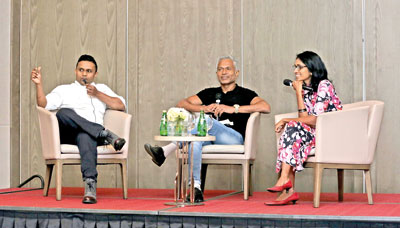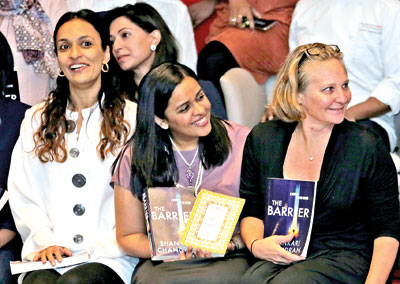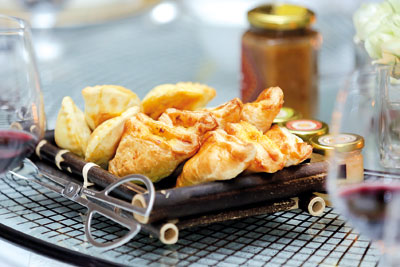Arts
From memories past to dystopic future
Shankari Chandran had flown in just the previous night from Australia, for the Fairway Galle Literary Festival but Monday, the petite author was in sparkling form as she sat down with well known writer Ashok Ferrey and fellow FGLF guest, New York-based Chef Charles Disa at a Literary Salon presented by the Silent Community of Readers (ScoR) at Colombo’s Shangri-La Hotel. Chef Charles’ thoughtfully created menu for lunch was a tribute to some of the foods – delectable crab cutlets, malu paans and prawn mustard curry among them, that feature in Shankari’s book ‘Song of the Sun God’ ‘which released in 2017 had taken the author to a high degree of acclaim.

Shankari Chandran (Pictured on our Magazine cover and here) : In relaxed conversation with Ashok Ferrey (centre) and Chef Charles (left). Pix by Sameera Weerasekera
By today we will know if ‘Song of the Sun God’ has won the Fairway Literary Award 2017 but last Monday in the elegant confines of the Shangri-La, the subject was her second book, a dystopic thriller set in a post- world war, Ebola survivor world – ‘The Barrier’.
The lawyer turned writer, mother of four – two “Bigs’ and two ‘Littles’ as she calls them, self-confessed lover of books and chocolate, was born in London and raised in Australia. Shankari worked for ten years at an international law firm in London running their social justice programme spread across some 30 countries. “I’ve always been passionate about social justice ….. it was a privilege to work in that field and I draw from a lot of that experience in my writing,” she told the audience. Her work included ensuring representation for detainees in Guantanamo Bay to training lawyers in Rwanda, and even advising UK Prime Minister Gordon Brown.
This was her second appearance (the first was via Skype) at ScoR, (begun as a book club in 2009 by Sarah Sammoon) and it was clear that she enjoyed the relaxed setting, talking to her audience with disarming candour and quick-witted humour, about her family, their strong influences on her life and her writing.
‘The Song of the Sun God’, her first book published by Perera Hussein was drawn from family memories, extensive research and her own deep attachment to this country. The central characters of Nala and Rajan, she says, were based on her grandparents at whose Colombo home, the family they would spend “these wonderful summers – all the cousins would return and my parents’ generation would all drop their kids and take off to India. My grandparents would be left, fully in charge of their wilful grandchildren,” she remembers. Her grandfather passed away a few years ago, her grandmother is 91 now.
“I do feel a very strong connection with Sri Lanka. We stopped coming after 1983 (for a couple of decades) – but Sri Lanka was always a presence in our lives because we were constantly aware of what was happening with the war. My father, his brothers, they felt so much grief, loss, anger and guilt -about having left and having survived and gone on to create fortunate lives for themselves…though we weren’t coming back, it was still a part of our hearts.”
Why is it that there is this strange pull that the country exerts on almost all our Sri Lankan expat writers even if they are no longer Sri Lankan, whether Ondaatje, Michelle de Kretser or Shyam Selvadurai, Ferrey asks, referring to it as a double-edged sword.

Waiting for autographs: Some of SCoR’s members at the Literary Salon
It is, Shankari concurs. “You are of the place but not of the place. It depends on which diaspora you are…..where is your new home being built, how you are received within that community….. There is a sense of dislocation and longing to belong and a seeking of your own tribe. I think people are very tribal – we seek that which we know, what resonates with us. For a lot of us in the diaspora- we are the other, wherever we are in the international community….We want to belong somewhere and so we seek a home in this place that has become almost mythical in its existence to us and all the more because we don’t come back. There is this longing, a yearning to belong and a mythologising of your place of origin, of ancestry – a place where your tribe came from and a disconnect between the two.”
The decision to move back to Australia from her life as a successful lawyer in London, came when she was expecting her fourth child. “My husband and I were both enjoying our careers and I was really having an opportunity to contribute to the social justice system there and I was working very closely with the Government on policy reforms and I wanted to keep doing that and yet I was having babies. Essentially I was always gestating or lactating,” she laughs. She explains that she wanted her children to have what she had- growing up with siblings and cousins – being raised by a community. “I think you have that in Sri Lanka and you take that for granted.
They say it takes a village to raise a child and I think they got that from Sri Lanka because your whole community raises you and I had that as a child in Canberra although it was a very small community.” Her husband is British South Asian -a Sri Lankan Tamil from South London and after acclimatising in Canberra they moved to Sydney where they now live.
Calling ‘The Barrier’ futuristic, bleak and harsh, Ferrey asked her what had made her go in that direction. “It has to be the first dystopic book by a Sri Lankan writer, I think? “I think I’ve always been ground-breaking, Ashok,” she says in droll response, drawing chuckles among the audience. My agent asked me that too, she adds. She explained that having finished ‘Song of the Sun Bird’, she was anxious – it had been draining. The answer was then to either binge on chocolate, binge watch TV or write – the last option being hugely therapeutic for her.
Witty and eloquent though she is, “by nature I’m very shy” she stresses, adding that she is very comfortable with her own company. “I prefer to be in my pyjamas, by myself, with my children, my dog, or with my brother, sometimes with my husband. After I finished writing the ‘Song of the Sun God’ I really had to re-engage with the world – I was binge-watching the news and the Bigs were asking me if they could read ‘The Hunger Games’. I told them they couldn’t read it until I had read it first.”
Then she had a confession- that she loves dystopic movies, dystopic fiction, it is a secret, guilty pleasure. “As a child I was always planning for the end of the world, always stocking up. Under my bed I had a little bag, I was ready to go!”

Food tribute from Chef Charles and the Shangri-La: Some of the delectables such as fish patties and chicken curry puffs found in ‘Song of the Sun God’
Then came the dawning realization that she found the news she was watching and dystopic fiction looked alike- confusing and terrifying. And she felt she wanted to write a novel for her children, that they could read, that they could be proud of, that was set in the East. Present too was the thought that when she scanned the best seller lists, she found they were dominated by Western authors writing about Western issues. “I wanted to write something set in the East, about the East where the East wins or at least where the East and the West work together to save the world.”
At the end of the first 10,000 words she realised it was far too violent for her children. So it became an adult dystopic novel. “But in it I tried to set out for them my view of the world – the things I want them to think about- our present day world order, and the political structure and the heirarchy of power that exists today – think about the historical context of power– who has colonised who and how it is that powers take the map and draw lines across that map, divide the world and apportion countries to different powers. About terrorism – are we born terrorists or are we alienated and pushed to be radicalised. And to think about fundamentalism in all its forms…. not just Islamic fundamentalism but the fundamentalism that we invite into the halls of power and to challenge that.”
“So it was for my children- a cautionary tale that they will read in the future or perhaps ignore as all children do ignore their parents.”
When Ferrey commented about the huge amounts of research she must have done for the book, she quipped, “I’m a closet scientist actually!” going on to speak of her father, a neurosurgeon, also a religious academic who though Hindu, practised many faiths and studied many philosophies, acknowledging the deep influence he had on her. In his later life he has become very interested in the relationship between faith and the brain. “I think this was my ode to him, to that upbringing of scientific inquiry and religious and spiritual inquiry.”
Then comes the exciting news that ‘Song of the Sun God’ will soon be made into a TV series. She may or may not be involved in the screenplay with all her current commitments and she laughs as she relates how she had to pitch it to the TV company by breaking down a sprawling story over seven decades,over three generations and three continents into a six-part series. She has been in the process of pitching ‘The Barrier’ to producers and reveals that her rejection list is long and illustrious.
Ridley Scott has looked at it and rejected it. She adds that one rejection came from an Academy Award winner who very kindly let her hold the Oscar and make a little “I would like to thank the Academy….” speech for her family!
Her third novel which she is currently working on is also set in Sri Lanka and as she spoke of how she had recently returned to the law (part-time), her many fans will hope that the secret notebook that goes with her to office (where story ideas are jotted down) will yield more books in the years ahead.
-Renuka Sadanandan

